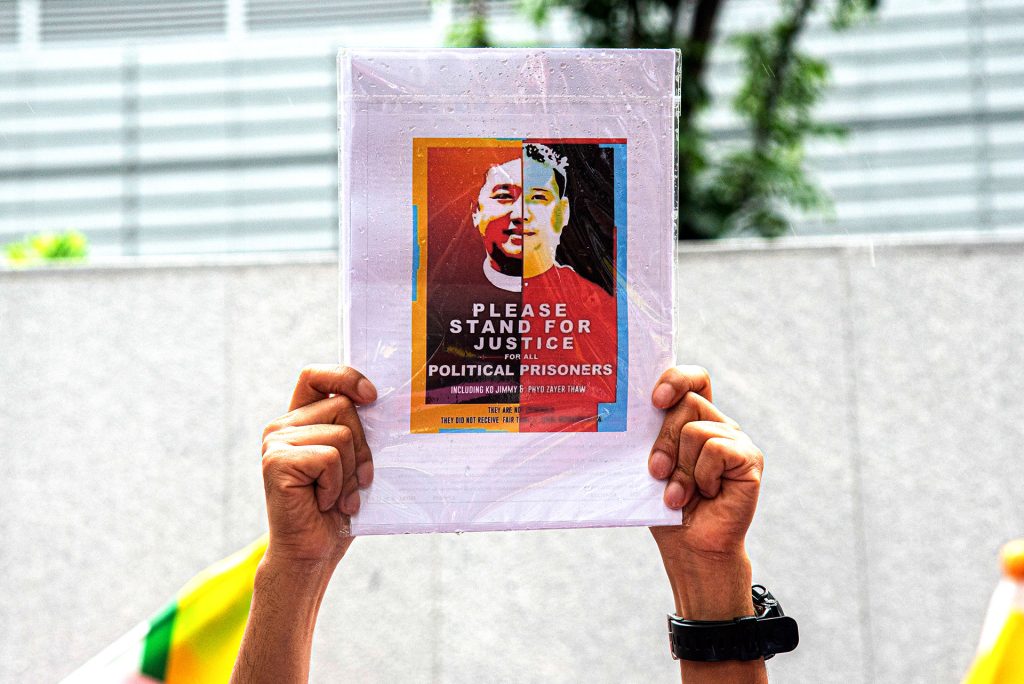On Point No. 11
(This article is a translation of the original Burmese language version that ISP-Myanmar posted on its Facebook page on July 27, 2022.)
∎ Events
Junta newspaper Global New Light of Myanmar on July 25 reported that death sentences had been carried out on Jimmy @ Kyaw Min Yu, Phyo Zeya Thaw, Hla Myo Aung, and Aung Thura Zaw. The junta’s July 26 press conference also confirmed the news.
∎ Preliminary analysis
The junta’s practice of executing those under politically motivated death sentences is the latest indication that ASEAN’s push for a ‘return to normalcy’ in Myanmar is over. Although the new trajectory of the country is still vague, it is certain that the ‘old normal’ – of problem definition and resolution within Myanmar politics – can no longer work to solve the current crises.

These death sentences are evidence that not only the junta’s middle ranks and low-level members but also the top brass are maintaining a policy of vengeance. Additionally, these executions could also be seen as a moral boost for the rank and file of Myanmar’s defense forces which have suffered great losses in post-coup conflicts. The junta’s carrying out of new politically motived death sentences for the first time in four decades seems like an opening act; it is worrisome that the junta could carry out more executions against anti-military activists. So far 129 people have been punished with death sentences, including those sentenced in absentia. Eighty-two people with death sentences are currently held in prisons in addition to the four who have recently been officially executed.
The United Nations, ASEAN, and governments from the Western democracies, Japan, and Malaysia have strongly condemned the executions. However, the governments of China, India, Thailand, and Indonesia, due to take ASEAN’s chair next year, are yet to make any condemnatory comments (at the time of this OnPoint’s release). It will be interesting to observe how these executions reflect in the junta’s diplomatic relations with key international stakeholders interested in resolving the Myanmar conflict. The executions were timely, conducted shortly after junta chairman Min Aung Hlaing’s visit to Russia. It can be presumed that more hardline countries’ support for the Myanmar military has boosted their confidence to act.
∎ Scenario forecast
Myanmar’s political setting, already grimy and polluted, has been further poisoned by these executions. The potential of ‘resolving political problems by political means’ is now the least likely path under the current junta’s leadership. The current coup leaders are losing legitimacy as responsible stakeholders for talks, while their criminal image is heightened. The window for international attempts at mediation by ASEAN or ‘ASEAN Plus’ countries has nearly closed. Calls for tougher sanctions and campaigns to punish Myanmar’s military council will now mushroom.
However, it is unlikely that any sanctions could effectively choke the junta’s main income source—energy. The recent executions could also trigger more attacks by underground forces in big cities. Similarly, junta mob attacks on the revolutionary forces, as seen in the past, will likely become more frequent. This will all likely continue to weaken the already deteriorating rule of law in the country. The executions also create a dilemma for some Ethnic Armed Organizations (EAOs), which have been invited to negotiate by the military council and which were planning to meet in the second round of junta peace talks. Ultimately, the return to executions reinforces the concept that ‘transitional justice’ is essential and inseparable in resolving Myanmar’s crises.



